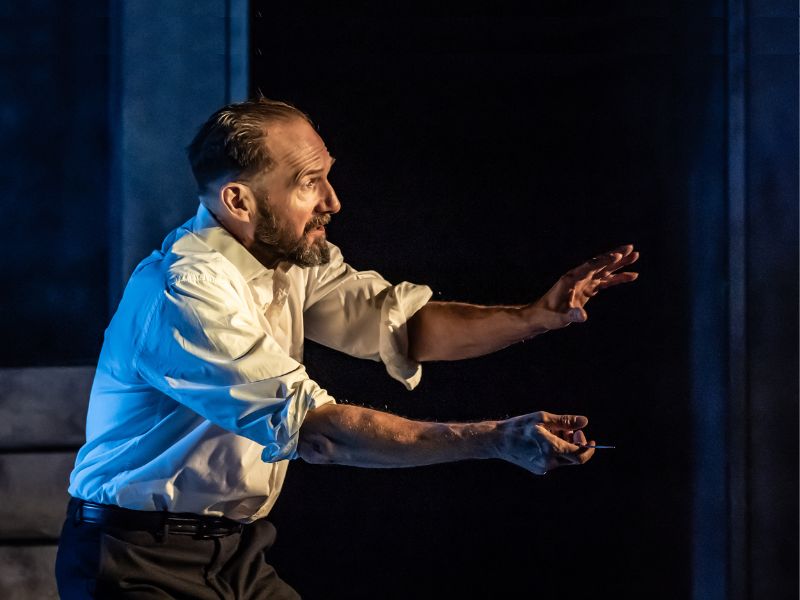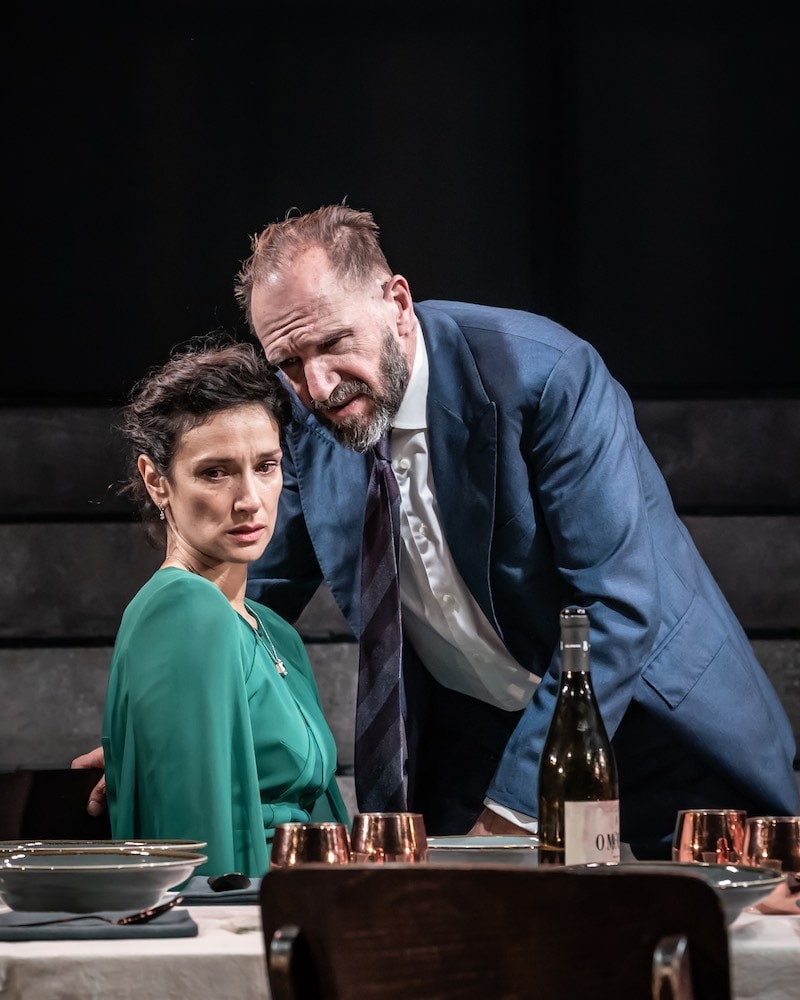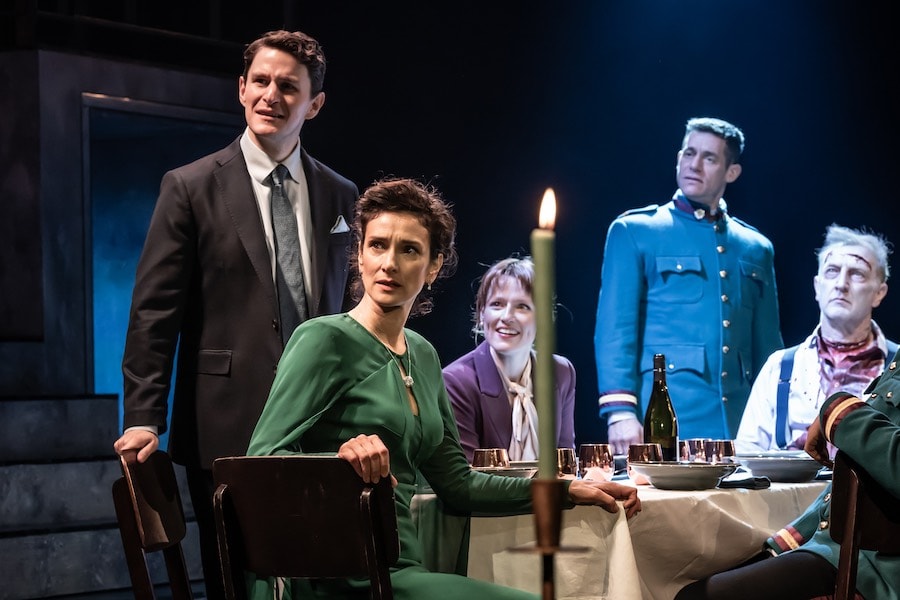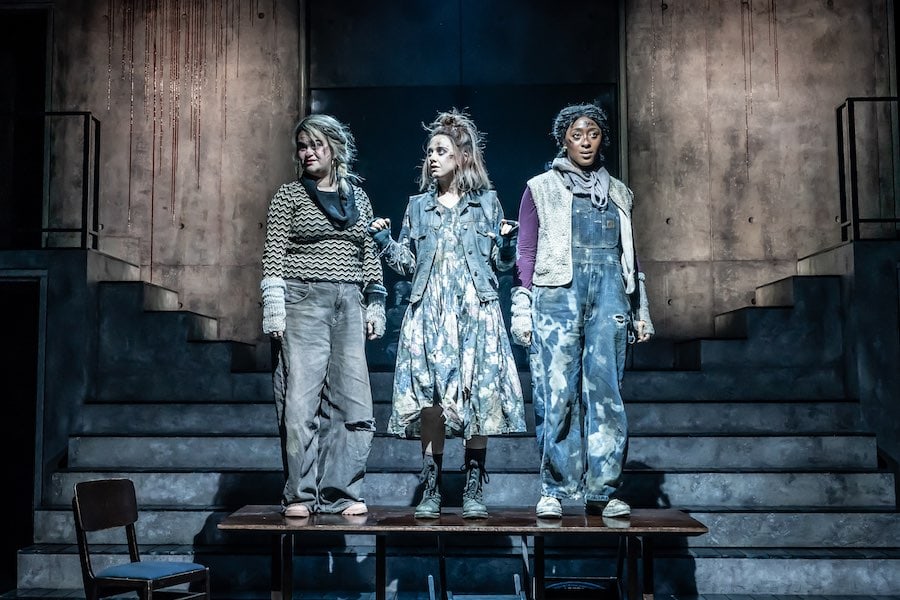“Blood will have blood,” soldier-cum-murderer Macbeth asserts midway through the play that bears his name. This sad, time-honored truth about the cyclical nature of violence lies at the heart of Shakespeare’s Scottish tragedy and of the Shakespeare Theatre Company’s stellar new production — adapted by Emily Burns and brought over from the UK — starring Ralph Fiennes and Indira Varma. There is unusual star power here, to be sure, but STC Artistic Director Simon Godwin and a remarkable cast breathe new, humanizing life into this familiar tale about the dehumanizing effects of repeated violence. Go all the way back to the ancient Greeks — evoked here in Frankie Bradshaw’s classically simple set design, with central staircase and symmetrical doorways — and you’ll see this lesson oft dramatized but never learned. In Godwin’s compelling modern interpretation, performed in the former Black Entertainment Television studios in Northeast DC, Macbeth’s entire world is the battlefield: a single set serves for every locale, and combatants range from rival political factions to trusted friends, manipulative spouses, and the individual human soul. Audience members enter this war zone themselves, crossing an anteroom strewn with concrete rubble and the glowing hulk of a burnt-out car in order to reach the playing space beyond. Overhead, Christopher Shutt’s soundscape of jet fighters and military helicopters gives way to the faint notes of a child’s music box. Innocence lost? Stolen? By now, we can all recognize the casualties of war, if relatively few of us in America have experienced it.

Among the many strengths of this outstanding production are the naturalism and clarity of its performances. Late in the play, Macbeth vows to make the “firstlings” of his heart the “firstlings” of his hand. But from the beginning of this production, the characters’ intentions, especially those of principals Macbeth (Fiennes) and Lady Macbeth (Varma), are readily apparent in the clarity and naturalness of their verbal and physical delivery. In soliloquy after soliloquy, we see the Macbeths’ innermost thoughts, delivered with the rhythms and pacing of ordinary speech, externalized in simple, effortless action and often directed to specific members of the audience. When Fiennes’ Macbeth (dressed as most of the characters in military fatigues) first imagines the frightening possibility of murdering King Duncan (“My thought, whose murder yet is but fantastical,” 1.3.141), he draws out his army knife as if on instinct, prompting us to recall that he is, after all, a man paid to kill. (Macbeth has just “unseam’d” someone from “the nave to the chaps” when the play begins.) Similarly, it’s a revelation to watch Varma’s Lady Macbeth, in capri pants and sweater, transition from girlish delight at the beginning of her famous opening soliloquy (when she receives word of her husband’s advancement) into the familiar femme fatale who recognizes what may be done as Duncan sleeps under her battlements.
The engaging naturalism and restraint of these performances (no bombast here) is enhanced by something rarely seen in productions of this dark play and which further endears the Macbeths to us: humor. Who knew the Thane of Cawdor had a sense of it? Or that he could or would dance a jig, as he does in the banquet scene of Act Three, scene four? There are moments in this production that are laugh-out-loud funny, as when the murderous Macbeths have the self-awareness to recognize the dark ironies of their situation and can mock themselves with self-deprecating humor. When Varma’s Lady Macbeth remarks on how the same alcohol that has made Duncan’s grooms drunk — and thus, unable to protect him — has had the opposite effect on her, a woman (it “hath made me bold,” she says), her unabashed surprise elicits laughter. Similarly, after his wife has bullied him into murdering Duncan by questioning his manhood, Macbeth — a decorated military commander — acknowledges defeat at the hands of a woman by sarcastically suggesting Lady Macbeth “[b]ring forth men-children only.” Here again, Fiennes’ understated, droll delivery evokes giggles of recognition from the audience. Another hen-pecked husband? The humor extends to minor characters, too, including Lady Macduff (a fine Rebecca Scroggs) and her children, in the first part of Act Four, scene two, in which Macbeth’s murderers descend on her castle. The contrast between Lady Macduff’s playful, funny exchanges with her daughter and the violence we know to be coming is all the more powerful because, under Godwin’s direction, the Macduffs are truly funny — not just innocent victims who exist to underscore another plot point about the extent of Macbeth’s evil. (On the other hand, this production does not include the one obviously funny scene in the play as written, which is the famous drunken porter’s scene of Act Two, scene three. It would be interesting to see what Godwin might have done with it.)

Perhaps the pivotal scene of this production, and certainly a turning point in the play itself, is the banquet scene of Act Three, scene four, in which the ghost of the murdered Banquo appears. Here again, economy, simplicity, and naturalism rule the day. Bradshaw’s suggestive set design provides for a simple wooden table — the production’s only furniture, apart from several small chairs — seating no more than six elbow-to-elbow. This is not banqueting on a regal scale; it’s more like a dinner party with the military couple next door. The intimacy of this scene — and the way it too toggles between humor and horror — allows us into the Macbeths’ lives in a way that isn’t possible with larger-scale productions. (According to notes provided by STC dramaturg Drew Lichtenberg, intimacy was one of Fiennes’ requests for the production, along with the use of industrial spaces.) Along similar lines, Banquo’s ghost is not a hoary, frighteningly decomposing presence, but someone who looks to have been beaten up (and knifed) behind the local roadhouse. Supernaturalism is downplayed here for a heightened naturalism; Banquo (an impressive Steffan Rhodri) may stand upon the dinner table, but Fiennes’ Macbeth does one better as, between fits, he plays the jolly host to hyperactive perfection. And when Macbeth tells his dinner guests that he has “a strange infirmity,” we laugh in response, uncertain whether he means his fits (epilepsy?) or the little jig he has just performed tableside.
As this production (and current events) attest, bloodletting requires little supernatural soliciting. The witches may spur Macbeth’s ambition with their half-truths, but here, they are casualties of war like everybody else, subject to the same violent traumas as Macbeth. (This is suggested by an event that kicks off the performance and that leaves corners of Macbeth’s headquarters, Dunsinane, in rubble.) Dressed by Bradshaw (also costume designer) as contemporary teenagers, perhaps inhabitants of a war-torn city, the witches (very ably played by Lucy Mangan, Danielle Fiamanya, and Lola Shalam) are more observers of the action than instigators of it, possessed spirits who prophesy but do not control. (Much like a Greek chorus, they pop up on the edges of the action throughout the play.) When Macbeth seeks them out for reassurance about his future (in Act Four, scene one), it is his own hired henchmen who reveal the extent of the witches’ equivocation. They, too, are possessed, like Macbeth and Lady Macbeth, by the traumas of violence. This is what war does to us, Godwin seems to suggest. If his witches are “weird sisters,” that may be because they are more psychically shattered victims of atrocity than supernatural beings.

Elsewhere, too, Godwin directs with a deft touch. The visual composition of many scenes — the banquet, Macduff’s castle, the witches on the steps, Banquo musing on Macbeth’s ascension to the throne — has a painterly quality. Pacing throughout is brisk, but not hurried, only slowing when necessary for dramatic effect, as when Macduff receives word of the murders of his wife and children and is too shocked to speak. Scenes like this one that can be difficult to stage effectively — including the attack on Macduff’s castle and the climactic sword fight between Macduff and Macbeth (with the severing of Macbeth’s head) — are carried out with the naturalness, simplicity, and evocative suggestiveness that is emblematic of this production.

The same is true as we move toward Macbeth’s inevitable demise. His nihilistic “I have lived long enough” speech (5.3), offered prior to Lady Macbeth’s death, is delivered here to a younger comrade as if it were a warning about Macbeth’s way of life. (Fiennes’ Macbeth is a perfectly weary, disillusioned figure in the last act of the play.) Nor is such intimacy and imaginative empathy lost as Macbeth approaches the fatal combat with Macduff. Like Brutus on the battlefield of Philippi, who sees the ghost of Caesar, Macbeth here glimpses a vision of his dead wife just before Macduff arrives to exact justice. Or is it vengeance? Ben Turner’s wonderfully sensitive Macduff does not seem happy or vindicated to have taken the life of the man who took those of his wife and children. Instead, he turns inward, as if suddenly aware of his own participation in the cycle of violence that has destabilized the kingdom of Scotland. He too is a killer. When, in his final lines, Macduff declares the time “free” and hails Malcolm the new king of Scotland, we can hardly believe him. There is no joy or relief here, whatever promises Malcolm offers in the play’s grandiose closing speech. In this disaster-strewn world, there is only foreboding and uncertainty, as the weird sisters mount the central stairs and take their places in silent vigil beside “bloody execution’s” latest victim.
Running Time: Approximately two hours and 45 minutes with an intermission
Macbeth plays through May 5, 2024, presented by the Shakespeare Theatre Company performing at 1301 W. Street, NE, Washington, DC. (Note that this is not at the regular STC theaters.) For tickets and information, including FAQs about the venue, go online. (The show is mostly sold out, but some return tickets/cancellations may be available. See website for details.)
The Asides program for Macbeth is online here.
COVID Safety: Masks are not required, but patrons are welcome to wear them if they choose.
SEE ALSO:
STC announces location, cast, and creative team for ‘Macbeth’ (news story, November 3, 2023)




